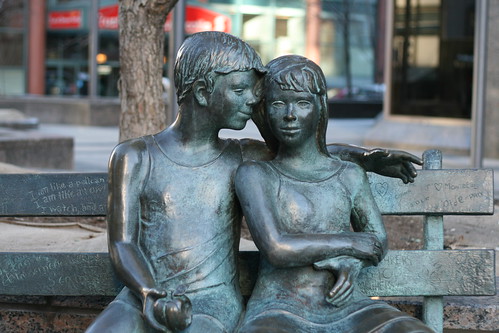[audio: http://fireinthepasture.org/wp-content/uploads/2012/03/tumblr_lxc4b0b5581qldxkx.mp3]
(My reading of “Cleave”)
I take Jim’s “it” to be, yes, sex—but also more than sex. It take it to be the much deeper state of being, the more-than-intimate connection, the dual state of oneness entered into when partners become more than lovers, lovers more than partners. Such eroticism goes much deeper and means much more than just the mutual coming to physical pleasure. I’ve written about such intimacy before: To be buried with another in sensuous pleasure; to be immersed in the rush of fluids, the passion, the organizational construct of sexual intercourse, the most earthy mortal craving, is to pass into a ritually enacted relationship between the sexes that serves as a source and metaphor for the broader connection between material and immaterial bodies across time and space. For what is sex but a primal (re)generative ritual meant to unite physical bodies in the propagation of the species and the shared invigoration of the flesh?
As Alicia Ostriker puts it in Dancing at the Devil’s Party, where she speaks about the intersection of poetic language and human passion, this “impulse to connect” bodies—whether those entities be words, lovers, or generations; flesh, psyche, and spirit; subject and object, artist and viewer, poet and reader—and thereby “to perceive unities across the conventional boundaries of separation” is “always implicitly erotic, always a form a making love.” It’s this impulse and the myriad reflections of it that, in effect, motivate the ritual processes bound up in the relationship between man and woman, in religious ceremonies, in human entrance into language (that arbitrarily organized system of signs through which we name our experience with the world), and in our approach to death.
Jim ruminates on this impulse in “Cleave,” wondering over the ways “we” come into the fullness of our bodies and experience a holistic sexuality. And who is this “we,” this collective body in which the poet includes himself? Per line two of the poem: those “who have never done it before”—and in light of the epigraph of the poem, I’m going to tack “marriage” on the end of that: those who have never had sex before marriage. Within the Mormon context of the poem—it was written by a Mormon poet and published in Literature and Belief, a journal housed at Brigham Young University—I also take this “we” to be not simply pre-marriage virgins, but perhaps a prudish, Puritanical people who may fear the body and its processes and desires and who may further have some cultural history of socially deviant sexuality (as Mormons, who have “a pedigree of plural wives” stretching back, through claims to both God’s covenant and literal ancestry, to “Abraham” and, more recently, through the church’s founder “Joseph” Smith).
So, “[h]ow do we do it”? How do we learn to negotiate the messiness of it all, the bodies “tangled,” come together in such a way that it’s difficult to tell where one ends and another begins? “How do we approach the subject / that burns our mouths like soap,” burns both literally and figuratively—literally in that sometimes when our kids talk about sex, it’s in “potty” ways that may lead to mouths being washed out with soap; and figuratively in that the subject is holy and, if approached properly, with respect, and in the proper context, it can be cleansing, like soap, like fire? How?
The poet’s call-and-response-type poem suggests some answers beyond those I’ve suggested here. Most importantly, however, his use of questions—he does after all leave his inquiry wide open—suggests that we shouldn’t shrink from the asking. We need not blush, as a culture or as individuals, when we get curious about the body and its desires. Maybe instead we just need to learn to ask—and to summon the courage to ask—each other in proper context the right questions about what these desires mean and where they can carry us and our relationships. As the poet models here, such questions, I think, and such literature as this poem can get us thinking about sex in transformative, redemptive ways. And I for one am all for that.

